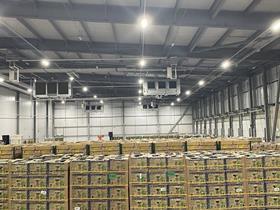
Freshfel Europe has said that the fresh produce sector had 'warmly welcomed' the UK government’s recent announcement that the requirement of phyto certificate and SPS checks will be postponed until 1 July 2022.
It followed Freshfel’s support for flexibility and trade facilitation measures before SPS controls and phytosanitary certificates are introduced by the UK for EU fresh produce exports.
The prolonged transition should be 'wisely used' by the sector and EU and UK authorities to ensure that trade facilitation measures such as electronic certification are fully operational by the time phytosanitary certificates are required for EU exports, the organisation said.
In addition, the time should be used to reflect on more trade-friendly scenarios for the industry on both sides of the Channel, namely by securing an agreement on regulatory convergence for SPS and reducing red tape and unnecessary costs.
In its written announcement on 14 September, the UK’s minister of state in the Cabinet Office (the Rt Hon Lord Frost CMG), agreed to postpone the introduction of phytosanitary certification obligations for EU fresh produce, expected by 1 January 2022, until 1 July 2022.
Physical checks at Border Control Posts on fresh produce will be applied from 1 July too instead of 1 March 2022 according to the statement.
“The EU supplies 40 per cent of the UK’s fresh fruits and vegetables, more than 3m tonnes per year, comprising of a wide range of highly perishable commodities,' said Freshfel Europe general delegate Philippe Binard. 'The introduction of SPS controls and certifications for most of this trade can greatly damage trade flows and availability of fresh produce in the UK market, since over 750,000 and up to a million phytosanitary certificates will be required on an annual basis depending on the consignment structure to sustain this flow.
'Therefore, the sector still encourages the EU and the UK to reflect on ways to make possible a ‘best case scenario’ for the industry and UK consumers,' he continued, 'by securing the maintenance of regulatory convergence on both sides of the Channel, thus removing the need for SPS checks overall and the threat of higher prices or scarcity of sensitive produce categories.”
Freshfel urged the EU and the UK to work together to avoid building unnecessary red tape and market access excessive burden.
“Border procedures are leading to administrative additional costs for business operators,' Binard noted. 'Most of them respond to health, safety or quality control procedures, matters that never raised any concerns during the more than 40 years of UK membership to the European Union and covering requirements that are often stricter from the private sector.”
“Operational preparations and trade facilitation measures should be hastened, to ensure operationality on 1 July 2022 if controls are introduced despite everything,' said Freshfel's director for trade and market access Natalia Santos-Garcia Bernabe. 'Among these, securing the operationality of the electronic transmission of phytosanitary certifications within the framework of the IPPC ePhyto hub remains a key priority, an effort that requires the joint technical work of EU Member States, EU and UK authorities.
'The sector also needs the UK to concretise the implementation of trade facilitation protocols to ensure SPS controls of mixed consignments are conducted in a timely manner when needed, given their importance in EU-UK trade.”



